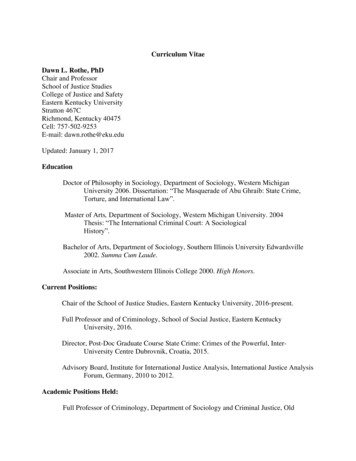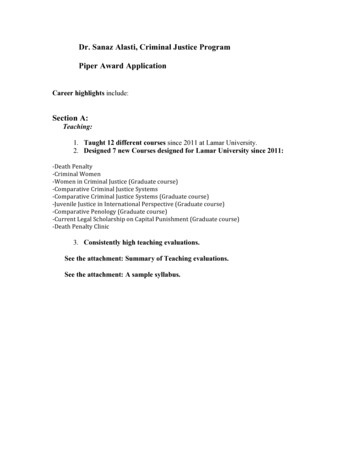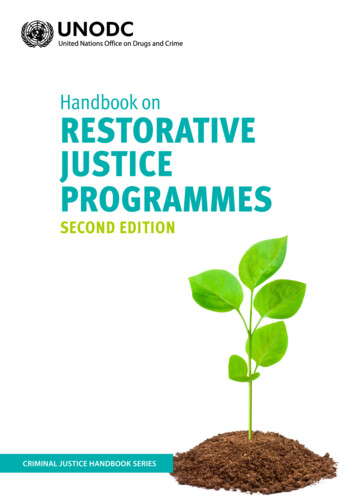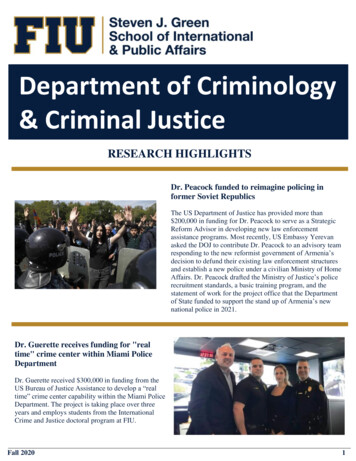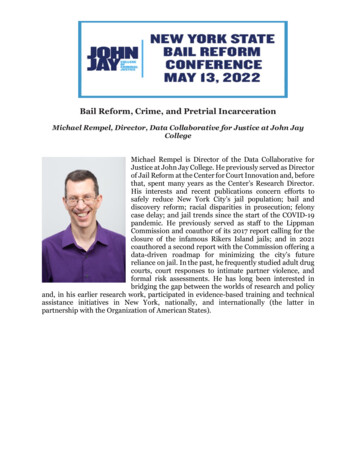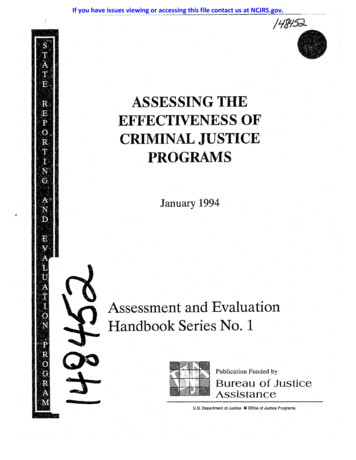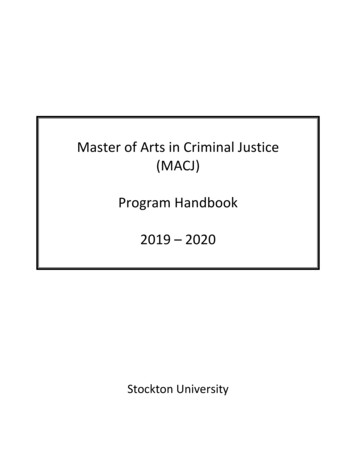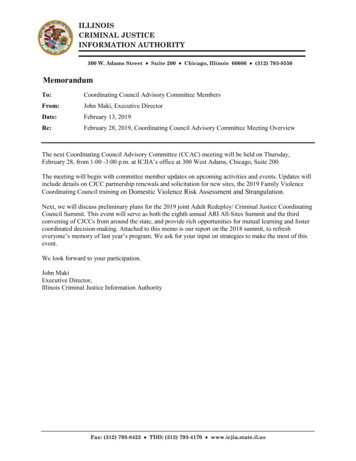
Transcription
ILLINOISCRIMINAL JUSTICEINFORMATION AUTHORITY300 W. Adams Street Suite 200 Chicago, Illinois 60606 (312) 793-8550MemorandumTo:Coordinating Council Advisory Committee MembersFrom:John Maki, Executive DirectorDate:February 13, 2019Re:February 28, 2019, Coordinating Council Advisory Committee Meeting OverviewThe next Coordinating Council Advisory Committee (CCAC) meeting will be held on Thursday,February 28, from 1:00 -3:00 p.m. at ICJIA’s office at 300 West Adams, Chicago, Suite 200.The meeting will begin with committee member updates on upcoming activities and events. Updates willinclude details on CJCC partnership renewals and solicitation for new sites, the 2019 Family ViolenceCoordinating Council training on Domestic Violence Risk Assessment and Strangulation.Next, we will discuss preliminary plans for the 2019 joint Adult Redeploy/ Criminal Justice CoordinatingCouncil Summit. This event will serve as both the eighth annual ARI All-Sites Summit and the thirdconvening of CJCCs from around the state, and provide rich opportunities for mutual learning and fostercoordinated decision-making. Attached to this memo is our report on the 2018 summit, to refresheveryone’s memory of last year’s program. We ask for your input on strategies to make the most of thisevent.We look forward to your participation.John MakiExecutive Director,Illinois Criminal Justice Information AuthorityFax: (312) 793-8422 TDD: (312) 793-4170 www.icjia.state.il.us
ILLINOISCRIMINAL JUSTICEINFORMATION AUTHORITY300 W. Adams Street Suite 200 Chicago, Illinois 60606 (312) 793-8550Coordinating Council Advisory Committee MeetingThursday, February 28, 20181:00 p.m. to 3:00 p.m.300 W. Adams, Suite 200, Large Conference RoomChicago, IllinoisAGENDAI.II.Call to Order and Roll CallApproval of Coordinating Council Advisory Committee MinutesIII.Member updatesIV.Discussion on 2019 ARI/CJCC SummitV.VI.VII.New BusinessPublic CommentAdjournThis public meeting will be accessible to persons with disabilities in compliance with Executive Order #5 and pertinent state and federal lawsupon anticipated attendance. Persons with disabilities planning to attend and needing special accommodations should contact by telephone orletter John Klaer, Illinois Criminal Justice Information Authority, 300 W. Adams St., Suite 200, Chicago, Illinois, 60606-5150, (312) 793-8946.TDD services are available at (312) 793-4170.Fax: (312) 793-8422 TDD: (312) 793-4170 www.icjia.state.il.us
1Collaboration in Action: Overview and Lessons from “Data, Planning, and Impact: A Joint AdultRedeploy Illinois and Criminal Justice Coordinating Councils Summit”IntroductionLast May, the Illinois Criminal Justice Information Authority (ICJIA) convened “Data, Planning, andImpact: A Joint Adult Redeploy Illinois & Criminal Justice Coordinating Councils Summit.” Organized inpartnership with Loyola University’s Center for Criminal Justice Research, Policy, and Practice, andthe Illinois Center of Excellence for Behavioral Health and Justice, the event served as both the annualAdult Redeploy Illinois (ARI) All-Sites Summit for practitioners working with ARI-funded diversionprogram, and a convening of the pilot Criminal Justice Coordinating Councils (CJCC) with whom ICJIA haspartnered with as part of the National Criminal Justice Reform Project.The summit’s goal was to bring together a broad range of stakeholders from counties and judicialcircuits either operating or interested in developing CJCCs and ARI-funded local prison diversionprograms and provide useful research and training on critical criminal justice trends and issues.Participants included probation officers and court personnel, judges, states attorneys and publicdefenders working on ARI programs and CJCC members, including judges, states attorneys, publicdefenders, sheriffs, county board members, service providers, and other law enforcementrepresentatives. ICJIA convened these groups to encourage partnerships that enhance local efforts toimprove the effectiveness and scope of criminal justice planning and practice.This report gives an overview of the first joint ARI/CJCC summit as a case study of ICJIA efforts to better“coordinate its coordination” by creating opportunities for engagement between state and localjurisdictions, as well as across and among local jurisdictions. This report offers an overview of summitprogramming, participant feedback, and recommendations for future CJCC and ARI program application.Background About CJCCs and ARIARI Program DescriptionAdult Redeploy Illinois (ARI) is a state-funded program designed to build and support more effective andless expensive community alternatives to incarceration for non-violent offenders. Established by theCrime Reduction Act (Public Act 96-0761) and housed at ICJIA, ARI provides grants to local jurisdictions(counties, groups of counties, judicial circuits) to support problem-solving courts, enhanced probationsupervision with services, and other evidence-based interventions responsive to the needs of theircommunities. As an accountability mechanism, ARI sites agree to reduce by 25 percent (based on thepast three years’ average) the number of people they send to the Illinois Department of Corrections(IDOC) from a locally defined target population.The goals of ARI are to: Reduce crime and recidivism in a way that is cost effective for taxpayers.Provide financial incentives to counties or judicial circuits to create effective locallevel evidence-based services.Encourage the successful local supervision of eligible offenders and theirreintegration into the locality.
2 Perform rigorous data collection and analysis to assess the outcomes of theprograms.ARI was modeled after the successful juvenile Redeploy Illinois program initiated in 2005. ARI was basedon the “performance incentive funding” best practice, intended to align fiscal and operationalresponsibility for non-violent offenders at the local level to produce better public safety at a lower cost.ARI provides funding and technical assistance to 22 sites across 45 counties.CJCC Program DescriptionCriminal Justice Coordinating Councils (CJCCs) are partnerships of decisionmakers who have a stake inthe effective administration of justice. Typically, the partnerships are organized at the county level andinclude representatives from:(1) The three branches of government (executive, judicial, and legislative).(2) Multiple levels of government (city, county, and state agencies).(3) Allied stakeholders from various other governmental entities, such as education orhealth and human services, community based organizations, service providers, andcitizens.CJCCs follow a structured, data-driven planning process to identify, analyze, solve, and manage justicesystem issues. This work leads to better understanding of crime and criminal justice problems, greatercooperation among agencies and units of local government, clearer objectives and priorities, moreeffective resource allocation, and better quality criminal justice programs and personnel. Takentogether, these results can increase public confidence in and support for criminal justice processes,enhancing system performance and, ultimately, the integrity of the law.As part of the National Criminal Justice Reform Project, ICJIA and Loyola University have partnered tohelp local jurisdictions access, understand, and use system-level data for strategic planning and systemsimprovement as they form CJCCs. ICJIA and Loyola partner with Lake, McLean, McHenry, St. Clair, andWinnebago counties CJCCs; CJCCs have been identified in several other counties, as well.Summit overviewICJIA conserved resources by convening ARI and CJCC program stakeholders together May 8-10. ICJIAhad an opportunity to leverage the networks of CJCC and ARI participants by hosting an event thatwould address the unique interests of each group while offering programming on data, research, andcoordination that was useful to both groups.To accomplish this, the agenda was structured to build in opportunities to focus exclusively on CJCC andARI programming and convene the groups in joint sessions, as well. The first half day focused on theCJCCs and featured strategic planning, an ARI introduction, and planning sessions. The next day’s fullday joint session for both groups included presentations on national and state perspectives oncoordination, case studies on efforts in Lake and McLean counties, and finding sustainable support forjustice programs. Also held were breakout sessions on critical topics of interest identified in ARI andCJCC surveys, including medication-assisted treatment, procedural justice, emerging adults, and trauma-
3informed care. The day also included a “CJCC 101” discussion, a panel on ARI eligibility expansion, andinteractive site reports from ARI members. The conference agenda is attached as Appendix A.Moving forwardOne of the primary goals of the summit was to use what was learned to inform ICJIA’s ARI and CJCCsprogramming and future coordination work.During the summit, ICJIA recognized a strong desire for more state-local coordination around criminaljustice issues. Several ARI sites expressed interest in starting CJCCs. The data-driven approach wasembraced by participants, with many requests for access to data on local jurisdictions and state trends.ARI stakeholders discussed improving and expanding the data feedback loop for their programs, whichcould both anchor and benefit from broader analysis at the CJCC level.Evaluations and discussions furthered the conclusion that a diversity of needs exists throughout thestate and program offerings should be better tailored to the unique needs of each jurisdiction.Coordination and program needs can vary substantially. Older CJCCs often already have strategic plansand bylaws, while newer CJCCs may need to wait to develop a commitment to joint planning prior tomoving forward. Mapping out the process of CJCC development while considering other coordinatedefforts, such as ARI, will help determine what inputs are most needed and when.On the same note, how challenges facing rural partners differ from those in more urban countiesbecame clear. Collaborative practices that have been effective in jurisdictions with more resources mayneed tailoring to be effective in places with less dense populations and fewer services. Summitparticipants requested a separate track for rural jurisdictions to problem-solve around their uniqueneeds. ARI’s work in rural jurisdictions can offer lessons learned for this area.Finally, the need for grant-making support, planning, and coordination were reinforced. Withoutresources it is difficult for counties to engage in collaborative work without staff members whoseprimary responsibilities are to lead the effort. In ARI, sites are required to have at least a quarter -timeequivalent staff person dedicated to program coordination and reporting. A grant investment in adedicated project coordinator at each CJCC site, perhaps expanding on the ARI role where applicable,could be a cost-effective way to support this work as well as connect efforts across ICJIA-fundedactivities. State or federal funding should be used to support coordinators over multiple years to allowfor continuity of coordination work.RecommendationsAfter a review of summit evaluations, discussion among program managers, and input from members ofthe ICJIA Coordinating Council Advisory Committee, the following recommendations for ICJIAprogramming were made:Focus on CJCC development: ICJIA should develop strategies to sustain current CJCC partnerships andbuild relationships with additional counties. This includes:a) Focusing on developing partnerships with colleges and universities to expand research andevaluation work with local jurisdictions.
4b) Incentivizing local planning and coordination activities through ICJIA grant making. Useplanning grants to create a longer term sustainable funding structure for coordination (e.g.terms of two-year or longer).c) Offer analysis of local criminal justice trends and issues to any county on request.Make coordination a key function of the ICJIA Board’s: Use ICJIA’s board and board committees to bettercoordinate work of state criminal justice and public health agencies.a) Task board with working on one concrete policy/coordination issue each year, with progressreports given at each quarterly meeting.Enhance representation of rural counties in ICJIA work: Ensure the views of rural counties are activelysolicited and that they are represented in policymaking (e.g. boards, task forces, etc.).a) All taskforces/ICJIA boards should have broad regional representation from Illinois (includingrural jurisdictions in Northern, Central, and Southern regions of the state)ConclusionThe joint ARI-CJCC summit represented an opportunity for ICJIA to hear from partners at the state andlocal levels about the successes and challenges of coordinated work and improve how ICJIA supportsthem. Leveraging shared resources to convene grantees and local partners helps ICJIA expand theimpact and reach of training programs and gives local stakeholders a chance to network and buildrelationships with each other to further mutual goals.Feedback received prior to the summit also encouraged program reassessment and adjustment toprogramming to ensure the needs of local partners are met. Planned are increased funding to supportcoordination and planning, making further strides to increase geographic representation in AR and CJCCactivities, and engaging the ICJIA Board with concrete projects that further this work.
Appendix A: Summit AgendaData, Planning, and Impact:A Joint Adult Redeploy Illinois andCriminal Justice Coordinating Councils SummitMay 8 – 10, 2018DoubleTree by Hilton Hotel Bloomington10 Brickyard DriveBloomington, IL 61701
Appendix A: Summit AgendaAgendaTuesday, May 8, 201812:15pmRegistration1:00-1:15pmWelcome and Opening RemarksJohn Maki, JD, MA, Executive Director, Illinois Criminal Justice Information Authority1:15-2:45pmWhat Comes Next? Discussion on CJCC Site Projects and Priorities after Trends and IssuesReport (1.5 CEUs – LSW/LCSW, LPC/LCPC, LMFT, Psychologist, IAODAPCA)John Maki, JD, MA, Executive Director, Illinois Criminal Justice Information AuthorityBryant Jackson-Green, MPPAc, Strategic Policy Advisor, Illinois Criminal Justice InformationAuthorityMarcus Hardy, BS, Executive Assistant to the Director, Illinois Department of CorrectionsHon. George W. Timberlake (Ret.), JD, MBA, Chair of the Illinois Juvenile Justice Commission2:45-3:00pmBreak3:00-4:30pmCreating and Implementing Strategic Plans(1.5 CEUs – LSW/LCSW, LPC/LCPC, LMFT, Psychologist, IAODAPCA)John Maki, JD, MA, Executive Director, Illinois Criminal Justice Information AuthorityBryant Jackson-Green, MPPAc, Strategic Policy Advisor, Illinois Criminal Justice InformationAuthority4:30-5:15pmAdult Redeploy Illinois 101 (0.75 CEUs – LSW/LCSW, LPC/LCPC, LMFT, Psychologist, IAODAPCA)Moderated by Mary Ann Dyar, MPP, Program Director, Adult Redeploy IllinoisMichael Torchia, MPA, Director, Sangamon County Probation & Court ServicesLeslie Van Riper, BA, Sangamon County Drug Court CoordinatorMurry Williams, Drug Court Graduate and Advocate5:15-6:45pmNetworking ReceptionWednesday, May 9, 20187:30-8:30Registration8:30-9:00amWelcome and Opening Remarks: A Statewide Perspective on CoordinationJohn Maki, JD, MA, Executive Director, Illinois Criminal Justice Information Authority9:00-10:15amThere’s No Low-Hanging Fruit—Which is Why Coordination is Essential(1.25 CEUs – LSW/LCSW, LPC/LCPC, LMFT, Psychologist, IAODAPCA 1.25 General MCLE)Denise O’Donnell, JD, MSW, Distinguished Senior Fellow, Litmus, New YorkUniversity Marron Institute of Urban Management10:15-10:30amBreak
Appendix A: Summit Agenda10:30-12:00pmCase Studies: Taking a Coordinated Approach to Major Criminal Justice Challenges(1.5 CEUs – LSW/LCSW, LPC/LCPC, LMFT, Psychologist, IAODAPCA 1.5 General MCLE)Moderated by Denise O’Donnell JD, MSW, Distinguished Senior Fellow, Litmus, New YorkUniversity Marron Institute of Urban ManagementLake County Opioid InitiativeChief Eric Guenther, MA, Chief of Police, Mundelein CountyKaren Wolownik Albert, MSW, LCSW, Executive Director, Gateway Foundation’s Lake CountyTreatment ServicesSteve Fabbri, MA, Assistant Director, 19th Judicial Circuit Court, Lake County Adult ProbationServicesMcLean County Criminal Justice Coordinating CouncilHon. Elizabeth A. Robb (Ret.), JD, Chair, Illinois Criminal Justice Information AuthorityFrank Beck, PhD, Associate Professor of Sociology and Anthropology, Illinois State UniversityJason Chambers, JD, State’s Attorney, McLean County12:00-1:30pm1:30-3:15pmBrickyard IBrickyard IIBrickyard IIIBrickyard IVNetworking LunchBreakout Sessions on Coordinated Approaches Examining the Challenges and Opportunities Emerging Adults Present to Criminal JusticeSystems(1.75 CEUs – LSW/LCSW, LPC/LCPC, LMFT, Psychologist, IAODAPCA 1.75 General MCLE)Lisa Jacobs, JD, Program Manager, Loyola University Center for Criminal Justice Research,Policy, and PracticeDavid Olson, PhD, Professor, Loyola University Department of Criminal Justice andCriminology; Co-Director, Center for Criminal Justice Research, Policy and Practice Addressing Opioid Use Disorder: Medication-Assisted Treatment (1.75 CEUs – LSW/LCSW,LPC/LCPC, LMFT, Psychologist, IAODAPCA. 1.75 General MCLE, 1.75 MCLE ProfessionalResponsibility – Mental Health and Substance Abuse Applied For)Lily Gleicher, MS, PhDc, Research Analyst, ICJIA Center for Justice Research and Evaluation Procedural Justice in the Criminal Justice System(1.75 CEUs – LSW/LCSW, LPC/LCPC, LMFT, Psychologist, IAODAPCA 1.75 General MCLE)Rachel Johnston, PhD, Associate Research Scholar in Law; Research Director for the JusticeCollaboratory, Yale Law School How Being Trauma-Informed Improves the Health and Safety of Your Criminal JusticeSystem (1.75 CEUs – LSW/LCSW, LPC/LCPC, LMFT, Psychologist, IAODAPCA 1.75 GeneralMCLE, 1.75 MCLE Professional Responsibility – Mental Health and Substance Abuse AppliedFor)Mary Gubbe Lee, MS, LSW, LCPC, Training Consultant, Illinois Center of Excellence forBehavioral Health and Justice3:15-3:30pmBreak3:30-5:00Show Me the Money: How Your Jurisdiction Can Find Sustainable Support for Criminal JusticeProjects (1.5 CEUs – LSW/LCSW, LPC/LCPC, LMFT, Psychologist, IAODAPCA 1.5 General MCLE)John Maki, JD, MA, Executive Director, Illinois Criminal Justice Information Authority
Appendix A: Summit AgendaSoledad McGrath, JD, Senior Program Officer, Joyce FoundationMarlana Dokken, BA, Regional Grants Program Manager, Region 1 Planning Council5:00-6:30Networking Reception
Appendix A: Summit AgendaThursday, May 10, 20187:30amRegistration8:30-8:45amWelcome and Opening RemarksMary Ann Dyar, MPP, Program Director, Adult Redeploy Illinois8:45-9:15amCriminal Justice Coordinating Councils 101(0.5 CEUs – LSW/LCSW, LPC/LCPC, LMFT, Psychologist, IAODAPCA)Bryant Jackson-Green, MPPAc, Strategic Policy Advisor, Illinois Criminal Justice InformationAuthorityDavid Olson, PhD, Professor, Loyola University Department of Criminal Justice and Criminology;Co-Director, Center for Criminal Justice Research, Policy and Practice9:15-10:15amMaking the Most of ARI: Target Populations and Eligibility(1 CEU – LSW/LCSW, LPC/LCPC, LMFT, Psychologist, IAODAPCA)Lindsey LaPointe, MSW, Senior Project Manager, Justice Reform, BPIHon. Janet Holmgren, JD, 17th Judicial Circuit CourtLiz Barnhart, BA, Court Consultant to McLean County10:15-10:30amBreak10:30am-12:00pmInteractive Site Reports (1.5 CEUs – LSW/LCSW, LPC/LCPC, LMFT, Psychologist, IAODAPCA)Adult Redeploy Sites12:00-12:15pmClosing RemarksContinuing Education Units:IDFPR Social Worker License # 159.001235IDFPR Counselor License #197.000210IDFPR Marriage & Family Therapist License #168.000205IDFPR Psychologist License # 268.000049IAODAPCA # 14261 Counselor I or II, CARS I or II, MISA I or II, PCGC II, CCJP I orII, CAAP I, CRSS II, CVSS II, CPRS I or II, MAATP II, CFPP II, NCRS IIMCLE Credits: 6 General Credit hours of which 1.75 Professional Responsibility– Mental Health and Substance Abuse Applied for
ILLINOIS CRIMINAL JUSTICE INFORMATION AUTHORITY 300 W. Adams Street Suite 200 Chicago, Illinois 60606 (312) 793-8550 Fax: (312) 793-8422 TDD: (312) 793-4170 www.icjia.state.il.us Memorandum . To: Coordinating Council Advisory Committee Members

